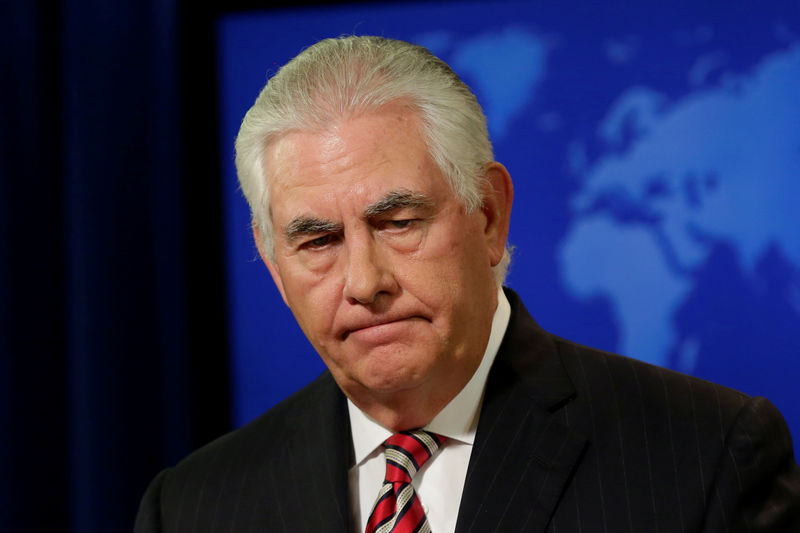By David Brunnstrom and Yeganeh Torbati
WASHINGTON (Reuters) - U.S. Secretary of State Rex Tillerson appeared to make a peace overture to North Korea on Tuesday, welcoming what he called the restraint it had shown recently in its weapons programs and saying he hoped a path could be opening for dialogue "sometime in the near future.""We have had no missile launches or provocative acts on the part of North Korea since the unanimous adoption of the U.N. Security Council resolution," Tillerson told reporters, referring to U.N. sanctions on North Korea agreed on Aug. 5.
"We hope that this is the beginning of this signal that we've been looking for - that they are ready to restrain their level of tensions, they're ready to restrain their provocative acts, and that perhaps we are seeing our pathway to sometime in the near future having some dialogue," Tillerson added.
Tillerson said he was "pleased" Pyongyang had "demonstrated some level of restraint that we've not seen in the past."
"We need to see more on their part, but I want to acknowledge the steps they've taken thus far," he said.
Tillerson's words appeared aimed at encouraging dialogue, even though the State Department this month said North Korea had "a long way to go" before Washington would consider talks.
North Korea has conducted two nuclear tests and dozens of missile tests since the start of last year and Washington says the aim of any future talks must be denuclearisation, something Pyongyang has rejected as long as the United States maintains a "hostile policy" towards it.
North Korea's last missile test was of a second intercontinental ballistic missile on July 28. This put the U.S. mainland in range, prompting heated exchanges of threats and rhetoric that raised fears of a new conflict on the Korean Peninsula.
U.S. President Donald Trump earlier this month warned North Korea it would face "fire and fury" if it threatened the United States. Pyongyang responded by threatening to fire missiles towards the U.S. Pacific island territory of Guam, but later said it was holding off while it waited to see what the United States would do next.
TRUMP'S PRAISE
Last week, Trump praised North Korean leader Kim Jong Un for his "wise" decision, while U.N. Secretary-General Antonio Guterres said he had told Russia, Japan, the United States, China and North and South Korea he was available to help broker talks.
So-called six-party talks aimed at persuading North Korea to give up its nuclear weapons programme collapsed in 2008 following a North Korean rocket launch, after which Pyongyang said it was pulling out of a 2005 agreement to freeze the programme.
In May, North Korea thumbed its nose at Tillerson personally by testing a missile just after the U.S. secretary of state chaired a U.N. Security Council meeting at which he warned that failure to curb Pyongyang's nuclear and ballistic missile programs could lead to "catastrophic consequences."
Tillerson's remarks on Tuesday came just after the United States announced new North Korea-related sanctions targeting Chinese and Russian firms and individuals for supporting Pyongyang's weapons programs.
China and Russia backed the U.N. sanctions but both countries have urged the United States to enter dialogue with North Korea in return for a freeze in weapons testing.
North Korea's envoy to a disarmament conference in Geneva, Ju Yong Chol, reiterated North Korea's stance on talks earlier on Tuesday.
"As long as the U.S. hostile policy and nuclear threat remains unchallenged, (North Korea) will never place its self-defensive nuclear deterrence on the negotiating table or step back an inch from the path it took to bolster the national nuclear force," he said.
Bonnie Glaser, senior adviser for Asia at Washington's Center for Strategic and International Studies, said there was a need for clearer U.S. messaging vis-a-vis North Korea.
"I wonder if Kim Jong Un will interpret Tillerson's remark as a positive gesture or a challenge to which he will respond with a missile test," she said.

"It must be tough for the North Koreans to make sense of all the different signals from the Trump administration. I hope that privately there is clear messaging about what is needed for resumption of dialogue, and what U.S. offers are on the table."